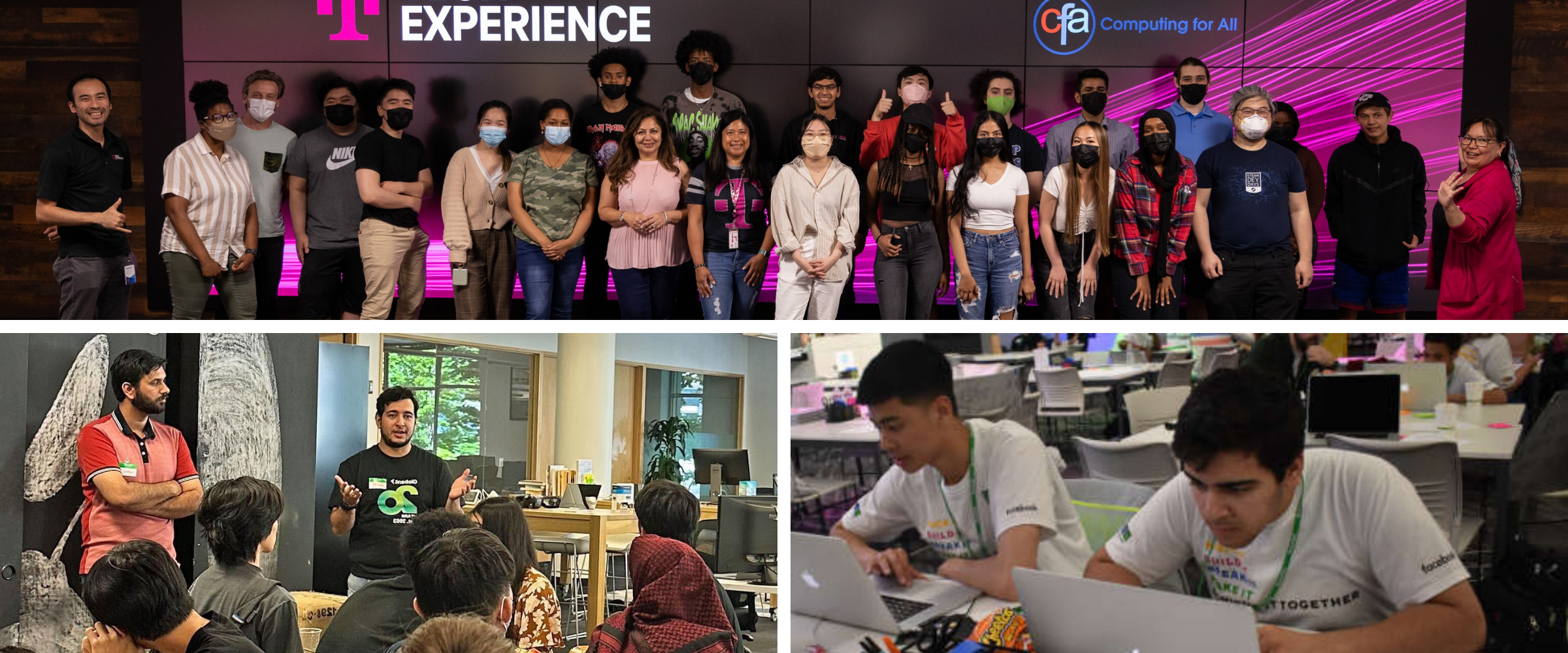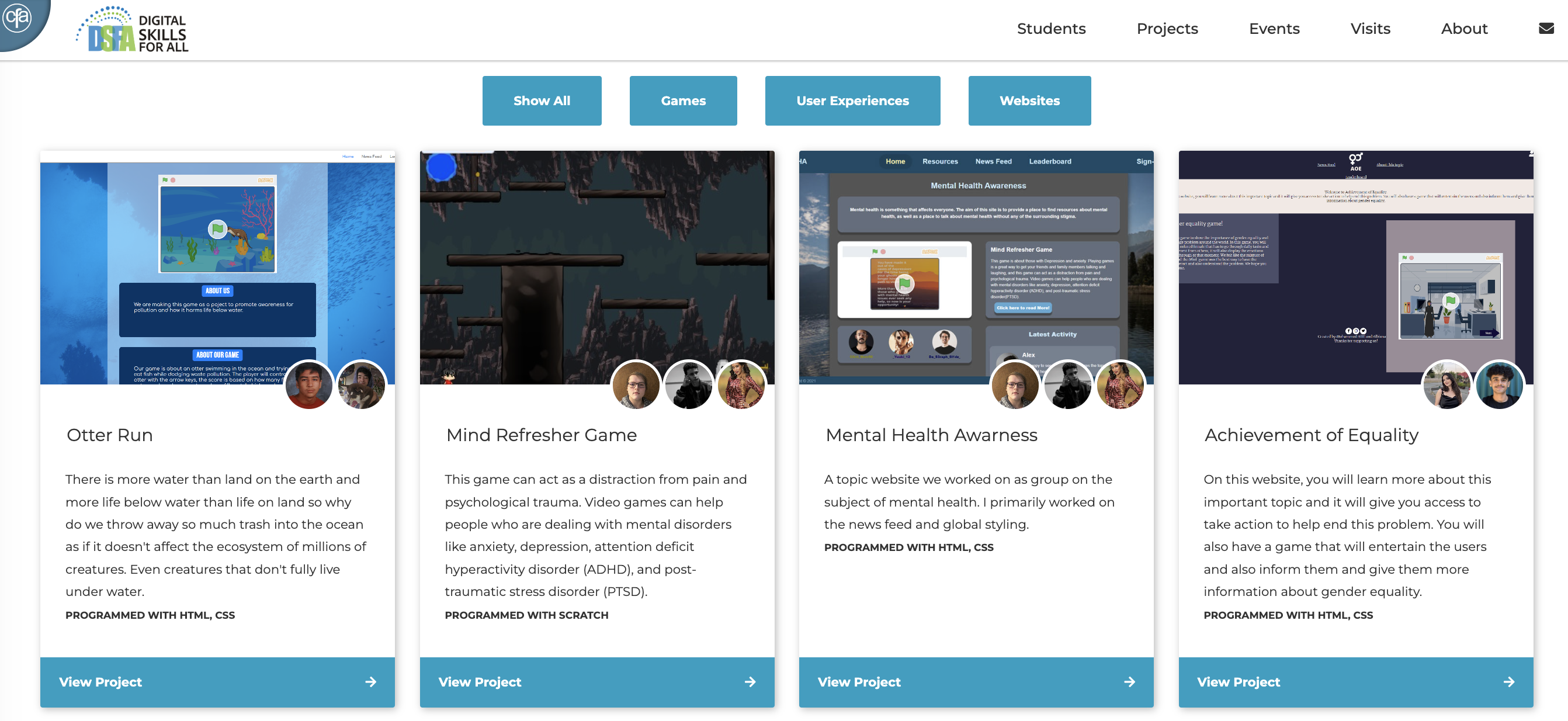Eastside organization proves that Computing [really is] for All
Even if 90 percent of the world’s data hadn’t been created in the past two years, closing the skills gap in the tech sphere is no simple feat.
However, all this data needs to be processed, which means we need many, many more brains equipped to do so. This is where organizations like Computing for All come in.
“Tech is impacting every part of our lives,” said CFA’s Director of Program Development, Mandira Virmani. “No matter what industry or domain you live or work in, you are going to need to know some technology. Our mission is to help young adults who are experiencing socioeconomic barriers to prosperity by providing them with the tech skills that can open doors to an upwardly mobile job in computer science.”
Virmani is just one of the techies who head up CFA — their leadership team came from jobs at tech giants like Microsoft, Amazon, Cisco, and more. Like many of her coworkers, Virmani swapped her high-powered corporate career for a more fulfilling role with the nonprofit.
While the exact details of their path to CFA may differ, each and every member of the team comes to employ their experience, commitment, unique skill set, and a sense of purpose to drive this work forward.
“People at the top tend to hire more people that look like them,” said Virmani’s Co-Director, Alka Manchanda. “So initially when I joined CFA, I was thinking ‘How can we get more women into tech jobs?’”
“Then, as we got more involved in the issues, it became clear that it's not just women who are getting left behind, it’s minorities of all kinds. Because they don’t have access to the training and networking necessary to get a job in computer science, they tend to think that tech is not for them despite the benefits of working in such an exciting, lucrative career."
“So, why are people being left behind?”
There are varying hurdles to overcome — cost, geography, digital access, a lack of confidence with technology, transportation, differing levels of college education, and more — and the institutional challenges don’t stop there.
Socioeconomic barriers like language and cultural barriers, racism, sexism, and poverty also come into play. CFA pays their Pre-Apprenticeship students a stipend, as a paid earn-while-you-learn program can make this opportunity work better for students who are low income. Their hands-on coursework utilizes exercises that are designed to accommodate student accessibility as much as possible, and program expectations are constantly adapting to better fit the needs of CFA’s students.
“Our programs are really designed to be an on-ramp,” said Manchanda. “We start off at the very basic level, and try to get people interested and inspired with career awareness speakers; industry mentors who talk about the story of their own career journey. Our teaching style is very hands-on, students apply what they are learning to projects at each stage of the program, and learn to work in teams using an Agile scrum approach much like they would in the workplace.”
So, by laying the foundational groundwork with beginning coding classes, providing wraparound support with the help of partners, and alleviating some of the financial burden of pursuing a new career, CFA students are encouraged to explore the tech space in a relatively low-risk way.
Computing for All is also the official sector intermediary for IT and cybersecurity in Washington, as well as a key component of the Governor’s Career Connect Washington initiative to bring career-connected learning into our state high schools and colleges.
“Our founder, Ritu Bahl, is all about researching and collaborating with education, government, and employers to help develop best practices and decide how can we make changes, like ‘What computer science curriculum should be taught in high schools and how can we keep it up to date with the workforce needs of the tech industry? How can we standardize this curriculum and at the same time make it more inclusive?’ to ‘Can we build stackable industry certifications into the two-year colleges?"
"Not everyone is able to pursue a 4 year degree.” said Manchanda. “So we are working to make changes across the whole continuum.”
Computing for All Highlights

The Programs
From their Pre-Apprenticeship Program — built for those between 16 and 24 years old — to 20+ week courses in Java & Cloud Computing or Cybersecurity Analyst Certifications, CFA works to find a path that works for students as individuals, rather than an archetype.
For Employers
Need a specialist for a proprietary system or unique tech stack? Pre-vet candidates from the CFA universe for full-time positions, internships, apprenticeships, or one-off projects.
Student Showcase
While learning the basics of coding, web design, etc., CFA students often create games or otherwise interactive websites to demonstrate their skills. Check out their work below!

